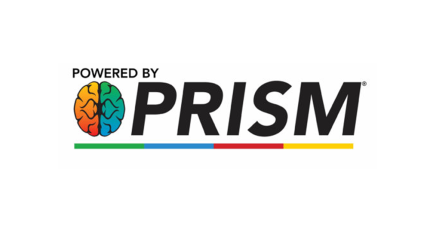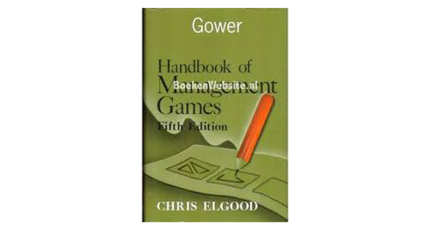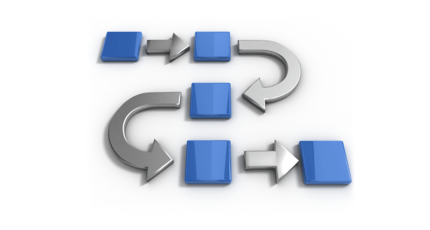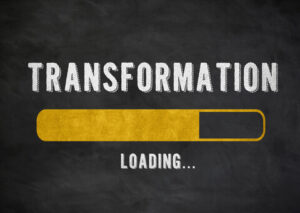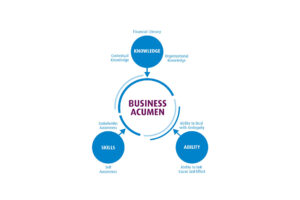We Design, Deliver and Enable
Does your organisation need a tailor-made learning and development solution and expert support to integrate it into your training programme? Training providers, would you like to use our cutting-edge products to assist your clients? Discover how Elgood can help.
We have been at the cutting edge of the design and facilitation of experimental learning simulations and games since 1972.
Our products equip our clients with the skills, understanding and knowledge to maximise their profitability, enhance their services and control their costs. They do this by developing individuals’ and teams’ business and commercial acumen and management capability.
Businesses, public sector organisations, academic and professional institutions and training providers use Elgood Effective Learning’s services because they deliver great outcomes.
Design Services
Let us design a management game or business simulation to embed in your learning and development programme to target your unique challenges and improvement areas.
It’s a three-step process:
- Analyse
- Design
- Deploy
Our partnership approach and products will increase your people’s commercial and business acumen skill and management capability.
Programme and Event Services
There are a variety of ways the Elgood Effective Learning team can support the delivery of your staff development or assessment events to maximise results.
- The full face-to-face package
- Online with remote facilitation by Elgood
- Supported by us run by you
We can also add value to your organisation by running team assessment/development events using simulations and psychometric tools.
Product Licencing
Training providers can licence Elgood’s market-leading business and commercial acumen games and simulations enabling them to broaden their client base and grow their revenues.
- Licenced products are fully supported
- Market insights and product selection advice provided
- Elgood can adapt products to suit your clients’ needs
By licencing our products for your use, our expertise becomes your client’s solution.
Frequently Asked Questions
What is a business simulation game?
The term business simulation game covers a wide range of activities, anything from a card based face to face activity to an interactive online one. It is used to refer to business focused activities deigned to develop business acumen and management focused activities designed to improve the way in which an organisation is managed. Our thinking has evolved to define a business simulation game as:
“A device through which individuals learn about how businesses and organisations work, and which enables them to improve their performance within their organisation through the development of business and/or inter-personal skills.”
The device offers participants a safe environment in which they can make decisions, experience consequences and understand the relationship between the two. It usually focuses on a problem area in which a better outcome could be achieved if people know more or behaved differently.
Some examples of the different types of simulation game can be found in our Ultimate Guide to Building Business Games and Simulations that Work .
What is a management game?
I will break this into two parts. The word game is used to describe activities in which some, or all, of these characteristics are prominent:
- Human, or humanly controlled, opponents, whose actions have an effect, upon each other and upon the environment.
- An emphasis on competitiveness and ‘winning’.
- An emphasis on pleasure, humour and enjoyment.
- A repetitive cycle of making decisions and encountering a result, allowing the hope of improvement and of ‘doing better next time’.
The addition of the word management indicates a focus on planning, management and control of any organisation or project in circumstances where profit is not the dominant measure of success.
What is Experiential Learning?
This refers to learning that an individual derives from experience. The term comes from the book Experiential Learning: experience as the source of learning and development published by David A Kolb (Englewood Cliffs, Prentice Hall, 1984).
In the book Kolb explained how a person learns through a cycle of discovery and experience. The Kolb learning cycle has four stages.
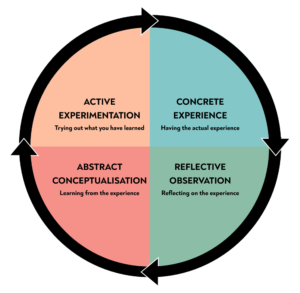
In situations where it is difficult for people to gain live experience the use of games and simulations can be used to mimic reality. The activity provides the active experimentation and concrete experience and the individual can then learn through reflective observation and abstract conceptualisation with the potential of going around the circle again to test out their new-found knowledge.
Retention rates from activities that incorporate experiential methods result in significantly higher retention rates – 75% from practice by doing in comparison to 5% from a lecture.
Research by National Training Laborotries.
A selection of our products
Our portfolio includes a range of products. Focussed activities seeking to develop a specific capability which can be facilitated by your in-house training team or a competent manager along with more complex simulations developing a range of capabilities which can be run by you in-house or with support from our team.
Elgood Effective Learning - for improved performance - call us today on 0118 982 1115
Insights
White papers
More and more businesses are turning to business games and simulations to...
In this white paper we explore three universal challenges every business faces...
The financial crisis prompted boardrooms to reevaluate their view of reputation and...
This White Paper discusses Ethics in Business Decision Making. An organisation is...
Organisational change is ubiquitous. According to the CIPD, “All organisations are in...

